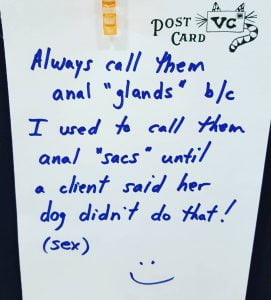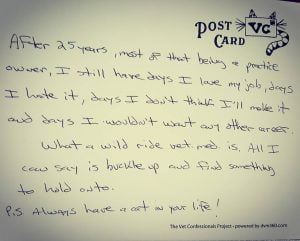I’ve just been reading the Facebook page of the Veterinary Confessionals Project. It is eye opening. It is enlightening and I would advise others to read the page. I confess that I have on occasions been too harsh on veterinarians. I have felt the same feelings that many others have felt. Sometimes, we feel that veterinarians are too greedy. Using Google, I can tell that some people feel that veterinarians are even worse than greedy, they feel that they are crooks or scammers – hence the title.
It is a complicated subject. We should not generalise. And here is the first problem: clients of veterinarians and the general public can tend to generalise about veterinarians. You can’t state that veterinarians are scammers because in making that statement you are saying that all veterinarians are scammers and crooks. That is positively not the case.
No doubt there are some veterinarians who have prioritised to an excessive extent profit over animal welfare but I’m sure that these examples are quite rare. Also, I would suggest that when big business becomes involved in veterinary practices and operate a chain of clinics, there is a greater tendency to be greedy because the operation is run by businessmen and accountants. This is in contrast to independent veterinary clinics which are owned and operated by the veterinarians themselves.
But it has come to light, although it must be known for a long time amongst veterinarians, that there is a high rate of suicide among veterinarians. Research is being done on why this should be the case. Having skimmed through the Veterinary Confessionals Project there are no doubt many reasons why veterinarians may become suicidal but one of them would be PTSD. Dealing with sick and injured animals and their death must be traumatic. The situation can also be compounded by ungrateful clients who demand the impossible sometimes.
In addition, there would appear to be a problem in some veterinary clinics with respect to the management of veterinarians and support staff by senior veterinarians. Not only does a junior veterinarian have to deal with the stresses and strains of dealing with sick and injured animals and their owners, they have to deal with their bosses as well. It would seem that some (not sure how prevalent this is) senior veterinarians are not providing enough support to trainees and associates. They appear to be putting junior staff through the same sort of difficulties that they themselves went through when they should be doing their best to alleviate these difficulties through excellent management and on-the-job training.
Other stressors for veterinarians would be long hours and dealing with ethical dilemmas. Then there must be the usual mistakes that veterinarians make which can prey on their minds. This is a very responsible job because dealing with someone’s pet is almost like dealing with a member of the client’s family. It is like treating a person. Arguably, veterinarians are not paid enough bearing in mind the high level of responsibility. In addition, veterinarians acquire a large debt accrued during training which has to be paid off. This financial burden must be taken into account when assessing whether a veterinarian is greedy or not.
Notwithstanding the stresses and strains of being a veterinarian there are some light moments and the Veterinary Confessional Project have a nice idea which is to let veterinarians and veterinary technicians and other support staff to confess to some of the amusing things that have occurred during their work by writing it down on a card. The cards are then posted on a board at conferences.
Presented on this page are some of those cards. Also, I have published an extract from a book which points to the vulnerability of your veterinarian as a person (as all people, arguably, are). Perhaps we demand too much of them. We think they can fix things – all health problems – as if we’re walking into a shop and buying something. Veterinary work is not like that quite obviously.
There is one interesting card from a senior veterinarian who has run his practice for a long time. He feels even after that time that he is an impostor. He feels that he shouldn’t be in the job because he is not good enough, it seems to me. I am certain that he is a very good veterinarian. Perhaps he feels undervalued. Perhaps he is too self-critical. Perhaps his clients have driven him to this attitude.
The Veterinary Confessional Project indicates to me that the clients of veterinarians can be too tough, impolite and ungrateful. Clearly not all clients are like that and once again we should not generalise but there would seem to be a minority of clients who don’t appreciate the service with which they are provided. For example, one receptionist and veterinary technician complains that she is not believed by clients but when a veterinarian says exactly the same thing they believe it.
I think I have made my point. We should not be too hard on veterinarians. They have to make a living. They have to run clinics and make a profit. They have to pay support staff and receptionist and so on. There must be countless overheads. These are all pressures; business pressures to which you have to add the pressures of dealing with the public and the stresses and strains of dealing with sick, injured and dying animals who are often treated as family members by their clients. It’s a difficult job. Some veterinarians have not done themselves a favour by, for example, over vaccinating and over testing or overprescribing but I sense, from this Facebook page, that the majority of veterinarians are decent people.
For me, however, there is one issue which I cannot reconcile with the veterinary profession in America and which I can’t run away from on this page even if it is critical of vets. I am not alone in this but I know that many people will disagree with me. I’m referring to that tricky and provocative subject which polarises people: the declawing cats. The vast majority, if not almost all veterinarians in America declaw cats. That in itself is a terrible indictment of the attitude of veterinarians. It really has to stop. It truly does because it undermines their profession dramatically. I know that I am going to bore people but it is against their oath, it is unnecessary, it looks as if the veterinarian is greedy, a lot of the operations are carried out badly, many cats are in a lot of pain, many cats suffer behavioural issues because of the operation (although many cats get through it reasonably well) and so on. Why does the profession carry out this operation? The amount of money they make from declawing is far outweighed by the way it undermines their profession and presents to the public the wrong image. Stop declawing and you will find that veterinarians are less stressed, more confident about their status in society, more loved and in a much better place.
P.S. The points raise here refer to vets in the USA but I am sure that vets in other countries have similar or identical issues to deal with.
P.P.S. Link to Veterinary Confessional Project FB page.










Like any other profession that deals with living entities, there’s the good, bad, and ugly. Kristen Lindsey has added a new category for me… “the evil and damned”.
Yes, I understand what you are saying. I too have similar views to yours. However, I felt a need to put some balance into the discussion. I don’t think we can say that all vets are greedy or insensitive and that sort of thing. But yes, there does seem to be an attitude amongst a number of veterinarians who prioritise financial profit over patient welfare which comes through in their behaviour. It’s a hazard we have to deal with. The trouble is that a veterinarian is combining a business with the health and welfare of animals and in truth the two don’t really go together that well. As business people they are doing nothing different to any other business person: trying to make the most money that they can from their skills and service. It’s okay when you’re selling a product like a car but when you’re treating patients and selling veterinary treatments the health of the patient is in question and under these circumstances prioritising financial reward is arguably unethical.
Thank you for commenting. Most of my articles about veterinarians are generally a little critical, for example with respect to the declawing of cats which is a classic example of prioritising making money over the health and welfare of the patient to the extreme detriment of the patient. It is the most clear-cut example of this ethical dilemma that veterinarians work under.
Having had pets for most of my life and dealt with vets over the course of that time, I have developed a very jaded attitude about veterinarians’ protocols and tactics.
Not all my experiences were less-than-positive, by no means — but there is a certain undercurrent with the numerous vets I have dealt with, that they care very much about making money off your visits with a minimum of effort, time, or analysis. They’re big on pushing expensive tests and procedures and reluctant or grudging about offering cost-effective low-stress treatments or useful advice. They can sometimes be close-mouthed, uncooperative, cold, and condescending. This is not a unique perspective I am articulating.
If society has begun to develop a negative opinion of veterinarians it’s usually based on tangible reasons.
Declawing in the US gives many a vet a bad name. Since it it mutilation and torture and performed solely out of greed, it’s hard not to see vets in this country in a bad light.
I have an amazing low-cost vet in Texas. He is a rarity. People love him and will come from a hundred miles then wait in line for 3 hours!! He doesn’t need fancy machines due to being a good intuitive (old school) vet. That said, if you need x-rays or extensive bloodwork you’ll have to go elsewhere. My contention is that many vets leaving vet school go right into a “How To Make $400K a Year Seminar!!
Michael, excellent!! I, fortunately, have an awesome vet who happens to be a personal friend as well. His overall costs are VERY reasonable. Other clients have stated this as well.
As with any profession, there are stress factors. I totally understand what most vets must deal with on a daily basis. People can really be jerks! I get this just being a dealer (croupier) in a casino!
But, the one thing that I truly wish would change here in the USA is to get de-clawing BANNED permanently!! It is an unnecessary, cruel procedure that is actually an amputation! When anyone asks me what I think about it, I tell them “well, let’s make an appointment to have the tips of all your fingers amputated, and them we’ll see if you like it! I get some pretty wild looks when I tell them that! But it is the truth!!!! I will NEVER get a cat de-clawed — EVER!!!!!!! I really think that it began in the US as a personal issue that people don’t want their *precious furniture* ruined. It is a convenience thing. Buy them a damned scratching post!! Get real idiots!! Furniture can be replaced — lives (toes) cannot!!! My home is for my cats to live in! I let them go where they wish, sleep where they want. I do have plenty of scratching things for them. However, they still occasionally want to use the furniture — and I don’t care. It’s their home too. They are little people to me, and I treat them as such! LOVE my *kids*!!! ♥♥♥
I will check out that page on facebook too. . . Thanks!! ♥♥♥